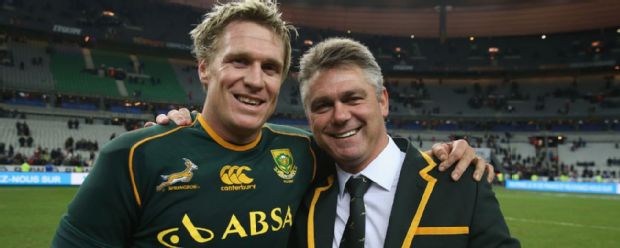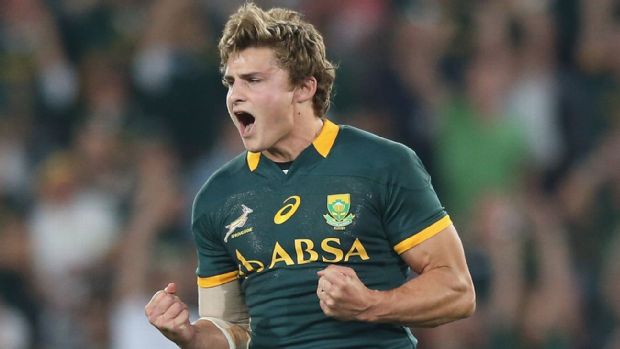|
South Africa
'Sentimental selections could cost Boks dear'
John Mitchell
August 12, 2015
 © Photo by David Rogers/Getty Images Heyneke Meyer is not a very good poker player. Having hastily returned Jean de Villiers to the starting line-up, he has shown his hand and created a selection criteria which seems somewhat hierarchical. De Villiers should have been managed to and through the World Cup by coming off the bench. It was a mistake by Meyer and it felt wrong to break up the centre pairing of Jesse Kriel and Damian de Allende, who had a blinder against New Zealand. It sent out all the wrong messages and tellingly De Villiers was even uncomfortable about the backline reshuffle. Perhaps he should have turned it down because it's not about rugby. It comes down to value systems, honesty and transparency, and making the right decisions. The value of leadership the 34-year-old brings to the team is unequivocal, but De Villiers demonstrated last weekend against the Pumas that he is not operating at top-end speed. He now faces a race against time to be fit for the World Cup after fracturing his cheek. We let down South Africa - Meyer
%]While Michael Cheika isn't managing experienced, ageing players in his group, Meyer and Steve Hansen are, and the latter two coaches run the risk of making sentimental World Cup selections. It's dicey stuff, but something that Sir Clive Woodward got away with. Aside from playing Paul Grayson in the 1999 World Cup quarter-final against South Africa ahead of a young Jonny Wilkinson, Woodward stayed with the same group of players, who would go on to win rugby's greatest prize four years later. However, it's not a proven formula for success. Meyer will have to juggle between the tried and tested and those wildcard options for the tournament. As much as you can admire South Africa for trying to develop their catch and pass, which should always be the case, the Boks have to get back to dominating the advantage line through the carry of their forwards. In recent times, that element of South Africa's game has gone missing, but why would you want to change what has proved a traditional strength? While it is partly down to personnel, there clearly seems to be a mindset to shift the ball along. However, the Springboks are not necessarily reading what is in front of them defensively. As such, the Springboks need to work on the role of the players at the back of the lineout. They run outside shoulder and need to track the inside shoulder first. On occasion, said players sit too shallow, so there's an inability to recover and track the attacker back into traffic. The Boks also has defensive issues at 10, 12 and 13. The trio are better off sitting a bit tighter and coming up together, while the No.12 shouldn't really react to anything in front of him until he has good knowledge of the third attacker out the back.  © Photo by David Rogers/Getty Images There has been plenty of talk in South Africa about fly-half Handré Pollard, who didn't have a great game on Saturday in Durban, and whether Pat Lambie should be starting in his stead. He gets his chance this Saturday in Buenos Aires. It is a selection call that will build up Lambie's sureness as he hasn't started a Test for the men in green and gold since lining up at pivot against England last November but only time will tell if that has an adverse affect on Pollard who may lose some self-confidence. Pollard is a very young fly-half so situationally his execution lets him down at times. Lambie makes better attacking kicking options, but Pollard is physical and can break the line or tackle bust. The 21-year-old Pollard is more comfortable with quicker ball and a running halfback. I'm not sure that Pollard's relationship with Pienaar represents much of an attacking threat as the latter serves more than he runs. Pienaar can only become a hazard if the ball is quicker. It's a tough decision for Meyer to make come the Rugby World Cup, but Lambie may prove the safer option. Although the Springboks ended as wooden spoonists in the Rugby Championship, history reveals the competition, which was formerly the Tri Nations, doesn't determine who wins the World Cup. They are separate entities and having been part of two World Cups in a coaching capacity what occurs beforehand is irrelevant unless teams allow it to affect them. While the Springboks have slipped to fifth in the world rankings they are certainly not outsiders for the William Webb Ellis trophy. They will have to find belief very quickly in the tournament, but one good game could give them the necessary confidence and momentum. © John Mitchell
|
Live Sports
Communication error please reload the page.
-
Football
-
Cricket
-
Rugby
-
- Days
- Hrs
- Mins
- Secs
F1 - Abu Dhabi GP
Abu Dhabi Grand Prix December 11-131. Max Verstappen ()
2. Valtteri Bottas (Mercedes)
3. Lewis Hamilton (Mercedes)
4. Alexander Albon ()
5. Lando Norris ()
6. Carlos Sainz Jr ()
-
ESPNOtherLive >>
Darts - Premier League
Golf - Houston Open
Snooker - China Open
Tennis - Miami Open

